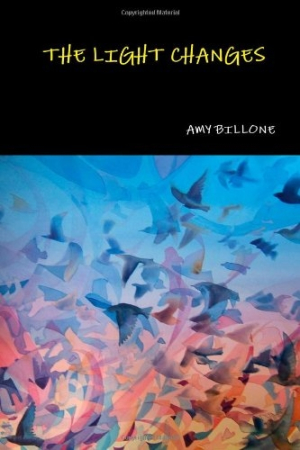The Light Changes
The poet’s expressive talents are far ranging, varying in word play and mood.
Deeply personal and dark, the poems in Amy Billone’s debut collection, The Light Changes, work best read together, for their meaning is illuminated in companionship. One of the first, “Grace,” begins, “I was raped by a speeding train. I asked it to.” This seems purely metaphorical until the disturbing connotation becomes clear from other poems—these words are actually more literal than that first impression. A devastating life-shaping event—her attempted suicide by jumping in front of a train—permeates the entire book.
The poet’s father, a scientist, appears in almost all of the poems. Some are even narrated by him, like “My Father Said,” in which he tries to work out, in austere technical terms, whether or not his daughter really tried to kill herself: “Collision of body with first / rail would be inelastic—Not much bounce / upward; Maybe flipped and rolled into ‘coffin / space’ between rails and ties.” The poem ends with the heartbreaking conclusion that “the mind of the girl was a distorted version of / the mind of my daughter. But the heart and soul / of the girl did not belong to my daughter.” Billone uses unadorned language to convey how this particular man deals with grief. It’s notable, because some pieces about her father, like “Enchantment,” are much more lyrical.
Other poems possess a frenetic, even crazed energy, such as “End of Summer,” with words running into each other: “I have a mind that glistensglares / I have a mind that cartwheelsspins.” Other times, as in “Reading Mrs. Dalloway at Junior’s Diner,” the lines slow down: “Everyone said // she was beautiful. Lovelier with age. And yet. The voices raced / ahead.” The poet’s expressive talents are far ranging, varying in word play and mood.
Not until the last section of this small book do themes begin to brighten. The poet addresses pregnancy and the joy connected to new life. Still, the suicide attempt hangs over her thoughts, as in the poem “First Breath,” which describes childbirth. Trying to heed her doctor’s advice and focus on her baby’s emerging head, “instead, I think of / how paramedics / pulled me from below / … drained / my bleeding brain.” Yet she fights her demons: “This is the most / important thing / you will ever do / … Give it all you’ve got.” While some might be put off by the collection’s overall darkness, others could find genuine solace in one artist’s struggle against, and triumph over, depression. As the title states, the light changes.
Billone has a PhD from Princeton University. She is an associate professor at the University of Tennessee, specializing in nineteenth-century English literature and children’s fiction. Her poems have been published in more than a dozen literary magazines, including the Bellingham Review Online, Chiron Review, and Plainsongs. It’s no surprise her first poetry book is professional and well made, without flaws or typos. The lovely cover art of a flock of birds in flight is, interestingly, by Maria Klawe, a computer scientist and president of Harvey Mudd College. Billone’s last poem in the collection, “If Nothing Else,” describes birds taking flight, like the starlings on the cover. Both the image and the poem portray coming to terms with the past, not letting it overwhelm, and embracing the hard work of moving forward.
Reviewed by
Olivia Boler
Disclosure: This article is not an endorsement, but a review. The publisher of this book provided free copies of the book and paid a small fee to have their book reviewed by a professional reviewer. Foreword Reviews and Clarion Reviews make no guarantee that the publisher will receive a positive review. Foreword Magazine, Inc. is disclosing this in accordance with the Federal Trade Commission’s 16 CFR, Part 255.

